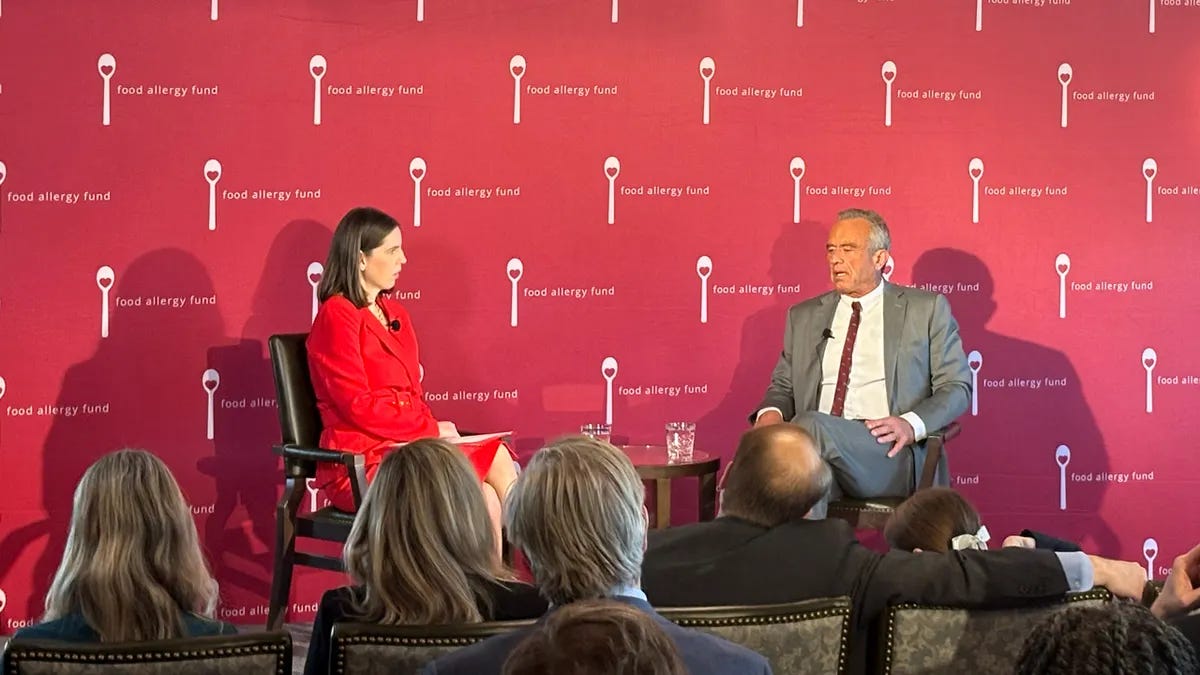RFK Jr. Is Wrong About Vaccines and Food Allergies
Why his claims collapse under real immunology, real epidemiology, and real evidence.
RFK Jr. claimed that the rise in food allergies—especially peanut allergy—may be caused by aluminum adjuvants in vaccines. He dismissed decades of rigorous research on early peanut introduction, cited fringe and retracted studies, misunderstood basic immunology, and suggested that scientists were somehow “forbidden” from studying the question. None of this is true, and the scientific evidence overwhelmingly contradicts his narrative.
To begin with, RFK Jr. brushes off the proven benefits of early peanut introduction by pointing to his own household, saying his family ate peanut butter constantly and still had allergies. This is a fundamental misunderstanding of how evidence works. Individual anecdotes can’t replace randomized clinical trials involving hundreds of infants. The landmark LEAP Trial, published in The New England Journal of Medicine, demonstrated that early peanut introduction reduces peanut allergy by more than 80%. That result has been replicated in multiple countries and confirmed across different populations. Prevention lowers risk—it doesn’t guarantee oral tolerance—so the fact that a few children develop allergies despite early exposure does nothing to invalidate the overwhelming data showing early introduction is protective. RFK Jr.’s attempt to disprove a global body of research with a single household story reveals how deeply unserious his reasoning is.
His central argument that aluminum in vaccines is responsible for food allergies falls apart just as quickly. The timelines don’t match; food allergies began rising before any widespread changes in aluminum-containing vaccines. They have been around since the 1930s. Aluminum adjuvants, which help induce a safe and targeted immune response, do not cause the kind of IgE-mediated allergic sensitization that leads to food allergies. To develop a food allergy, you need a genetically primed immune system, a disrupted skin or gut barrier, chronic or repeated mucosal exposure to an allergen, and cytokine signaling that triggers class-switching to IgE. A small and transient dose of aluminum in a vaccine does none of these things. If aluminum caused food allergies, we would see massive spikes in food allergies after every tetanus, hepatitis, or HPV booster. We would see seasonal allergies triggered by vaccine timing. We would see measurable waves of allergic disease after routine vaccination campaigns. We would see high eosinophil counts after each vaccination. None of this is observed anywhere in the world.
RFK Jr. tries to bolster his position by citing Anthony Mawson, a researcher whose “vaccinated versus unvaccinated” study claimed vaccinated children had dramatically more allergies. What he doesn’t say is that Mawson’s work was retracted for severe methodological flaws, including self-selected subjects, unverifiable outcomes, lack of randomization, and ethical violations. Every high-quality study involving millions of children across the U.S., Canada, Europe, and Australia finds no association between vaccines and allergic disease. The idea that Mawson’s retracted paper outweighs global epidemiologic evidence is absurd.
He also claims scientists have been “warned not to study” questions about vaccines and allergies, as if there is an institutional taboo. This is completely fabricated. Food-allergy research is one of the fastest-growing fields in modern immunology. The NIH funds large networks like the Consortium of Food Allergy Research (CoFAR). Organizations like FARE support Centers of Excellence dedicated to diagnosis, treatment, and prevention. Major randomized trials—LEAP, EAT, POISED, PETIT—have reshaped our understanding of how food allergies form and how to prevent them. Entire research programs exist to study environmental triggers, microbiome changes, skin-barrier dysfunction, atopic dermatitis, pollution, genetics, early-life immune development, and dietary patterns. Scientists aren’t being silenced; they’re producing thousands of papers a year. The only thing missing from this vast literature is evidence supporting RFK Jr.’s theory.
The real rise in food allergies has everything to do with the modern environment and nothing to do with vaccines. Increased rates of eczema and skin-barrier dysfunction allow allergens to enter the body through inflamed skin. Changes in diet, vitamin D deficiency, reduced microbial diversity, Caesarean delivery rates, pollution exposure, and shifts in our gut microbiome all play major roles. Delayed introduction of allergenic foods based on outdated medical advice prior to 2015 made the problem worse for years. These factors consistently appear across countries regardless of their vaccine schedules. Vaccines are not on the list, and they have never been shown to drive food allergies in any population.
Families deserve accurate, evidence-based explanations, not conspiracy theories dressed up as science. RFK Jr.’s claims about vaccines and food allergies are not just incorrect, they actively distract from the real causes we should be addressing and the real treatments we should be advancing. As someone who works with patients struggling with food allergies every day, I can tell you that the truth is already challenging enough. We don’t need myths layered on top of it.
If you want to learn more in detail about food allergies, anaphylaxis and other allergic diseases that are thoroughly evidence-based and easy to understand, please preorder my upcoming book, All About Allergies.
Preorder ALL ABOUT ALLERGIES in the US
Preorder ALL ABOUT ALLERGIES in the UK
Preorder a signed copy of ALL ABOUT ALLERGIES in the US from Anderson’s Bookshop



Omg like I haven’t lived 23 years with a peanut allergy for him to blame it on vaccines it pmo so much
“Can’t be allergic to peanuts if you’re already dead from diphtheria!” Excellent loophole